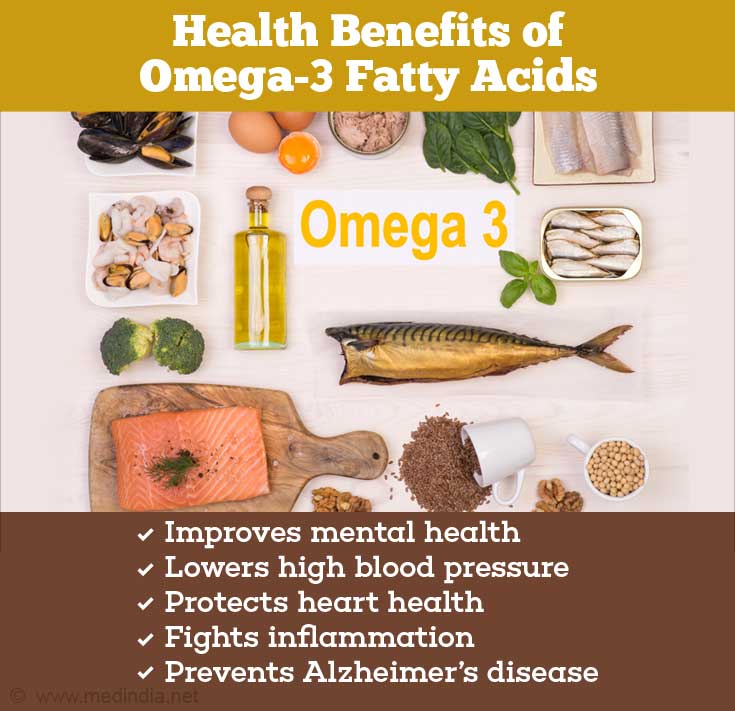Health Benefits and Supplements of Omega 3 Fatty Acids
Omega-3 fatty acids are purported to have many health benefits. Some of these include -
- Easing psychiatric disorders such as depression and ADHD
- Reducing the risk of heart attacks
- Lowering high blood pressure
- Fighting inflammation including certain cancers and rheumatoid arthritis
- Warding off Alzheimer’s disease
- Certain fatty fish, such as salmon, mackerel can reduce the progression and relapses in people with multiple sclerosis.

Let’s find out what recent research says about these benefits.
Omega-3 in Heart disease - Studies have indicated that consuming fish or fish oil (EPA+DHA) at doses higher than 3g per day reduced cardiovascular disease risk by decreasing blood pressure, platelet aggregation, and inflammation; but consumption of the vegetable oil–derived omega-3 fatty acid ALA is not as effective. Based on these results, the American Heart Association recommends that everyone eat oily fish twice a week and that those with coronary heart disease eat 1g per day of EPA + DHA from oily fish or supplements.
Omega-3 in Inflammation - Omega-6 PUFAs, such as arachidonic acid, have pro-inflammatory and omega-3 [eicosapentaenoic acid (EPA) and docosahexaenoic acid (DHA)] are anti-inflammatory. This is because omega-3s can inhibit the formation of omega-6 eicosanoids. Studies have shown that increasing the dietary intake of EPA and DHA through consumption of fatty fish, or fish-oil supplements helped reduce the incidence of many chronic diseases that involve inflammatory processes viz. cardiovascular diseases, inflammatory bowel disease (IBD), cancer, and rheumatoid arthritis.
Omega-3 in Mental illness - Omega-3 fatty acids, especially DHA, help to regulate the mechanism by which brain neurons communicate by altering the functioning of neural systems utilizing dopamine and serotonin, both of which are thought to play an important role in mental illness. Various studies have shown that omega-3 fatty acids can positively affect brain processes such as those that control mood and anxiety. However, using just EPA may be less effective than an EPA / DHA mixture. It is also important to consider therapies which include mixtures of both omega-3 and omega-6 PUFA.
Omega-3 in ADHD - Omega-3 fatty acids are dietary essentials, and are critical to brain development and function. According to Alexandra J. Richardson from the University of Oxford, UK, omega-3 plays an important role in ADHD, dyslexia, developmental coordination disorder (DCD) and autism. She also found that dietary supplementation with fish oils (providing EPA and DHA) appeared to alleviate ADHD-related symptoms in some children.
Despite the many benefits of taking omega-3, if you just concentrate on unsaturated fatty acids and ignore the other fatty acids, it could bring about the shortage of essential fatty acids that are crucial for your body. This disproportion could weaken the immune system, and increase the risk of heart disease, arrhythmia, and stroke.
Omega 3 Fatty Acid Supplements
The health benefits of eating omega-3 containing seafood are uncontested. However, the health benefits of omega-3 dietary supplements such as fish oil, flaxseed oil, and algae oils are still unclear.Although some studies have shown that omega-3 supplementation has a protective effect against heart disease, Korean researchers did not find sufficient evidence that omega-3 fatty acid supplements protected against overall cardiovascular events among patients with a history of cardiovascular disease.
Several other studies too have questioned the benefits of omega-3 fish oil supplements to the heart. Researchers at Fred Hutchinson Cancer Research Centre in Seattle, go even further by warning that taking high doses of omega-3 supplements or even one supplement a day can restrict the immune system and increase the risk of low-grade prostate cancer. So much so, 3 to 4 meals of fatty fish such as salmon and mackerel each week, could also lead to cancer risk, they say.
There are other safety concerns as well regarding omega-3 fatty acid supplements. For example, such supplements may interfere with the working of anticoagulants and NSAIDs by extending the bleeding time. These supplements also have side effects such as belching, indigestion or diarrhea.
However, the jury is still out on the issue of omega-3 fatty acid supplements.














